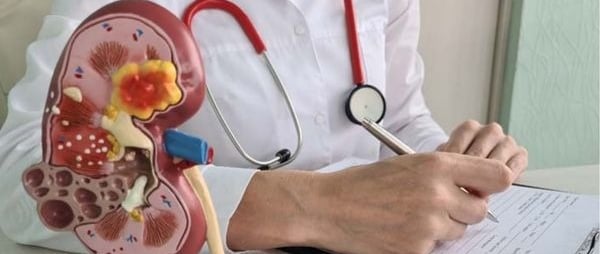Understanding Glomerulonephritis: Causes, Symptoms, and Treatment Options
Learn about glomerulonephritis, a condition affecting kidney function. Explore its causes, symptoms, and treatment options for effective management and care.
Dr. Avinandan Banerjee
1/4/20253 min read


Understanding Glomerulonephritis: Causes, Symptoms, and Treatment Options with Dr. Avinandan Banerjee
Glomerulonephritis is a serious kidney condition that affects the filtering units of the kidneys, known as glomeruli. This inflammation can significantly impair kidney function, leading to potential kidney failure if not properly diagnosed and managed. In this blog, we will explore the causes, symptoms, diagnosis, and treatment options for glomerulonephritis with expert insights from Dr. Avinandan Banerjee.
What is Glomerulonephritis?
Glomerulonephritis refers to the inflammation of the glomeruli, which are tiny structures within the kidneys that filter excess fluids, waste products, and electrolytes from the bloodstream. When these glomeruli become inflamed, they may no longer function effectively, causing waste and fluid buildup in the body.
Glomerulonephritis can present in two forms: acute (sudden onset) and chronic (developing over time). Both forms can lead to severe kidney damage if not treated promptly.
Causes of Glomerulonephritis
According to Dr. Avinandan Banerjee, the causes of glomerulonephritis vary, and understanding them is crucial for prevention and treatment. Common causes include:
Infections: Infections such as streptococcal throat infections (post-streptococcal glomerulonephritis) and viral infections like hepatitis B or C can trigger inflammation in the glomeruli.
Autoimmune Diseases: Diseases like lupus or vasculitis occur when the immune system mistakenly attacks the glomeruli, leading to inflammation and kidney damage.
Chronic Conditions: High blood pressure and diabetes can gradually damage kidney function, increasing the risk of glomerulonephritis.
Genetic Factors: Certain inherited conditions, such as Alport syndrome, can predispose individuals to glomerulonephritis.
Other Conditions: Some rare conditions, such as IgA nephropathy, also cause glomerular damage.
Symptoms of Glomerulonephritis
Dr. Banerjee highlights that the symptoms of glomerulonephritis can vary depending on the type and severity of the condition. The most common symptoms include:
Hematuria: Blood in the urine, often appearing as pink, red, or brownish discoloration.
Proteinuria: Excess protein in the urine, causing it to become foamy.
Swelling: Edema, particularly in the face, ankles, and legs, due to fluid retention.
High Blood Pressure: Elevated blood pressure caused by impaired kidney function.
Fatigue and Weakness: As kidney function decreases, the body may become fatigued due to the buildup of waste products.
Decreased Urine Output: A reduction in urine production or difficulty urinating.
Diagnosis of Glomerulonephritis
To diagnose glomerulonephritis, Dr. Avinandan Banerjee suggests several diagnostic methods, including:
Urine Tests: To check for blood and protein in the urine, which are key indicators of glomerulonephritis.
Blood Tests: Blood tests can measure kidney function, such as levels of creatinine and urea, and detect signs of infection or inflammation.
Kidney Biopsy: In some cases, a small tissue sample from the kidney is taken to determine the extent of glomerular damage.
Treatment Options for Glomerulonephritis
The treatment approach for glomerulonephritis depends on the underlying cause and the severity of the condition. Dr. Banerjee outlines several treatment options:
Medications:
Immunosuppressive Drugs: If the condition is caused by an autoimmune disease, medications such as corticosteroids or other immunosuppressants may be used to reduce inflammation.
Antibiotics: If an infection is the cause, antibiotics may be prescribed to treat the underlying infection.
Blood Pressure Management:
High blood pressure can further damage the kidneys, so medications such as ACE inhibitors or angiotensin receptor blockers (ARBs) may be used to control blood pressure.Dialysis:
In cases of severe kidney impairment, dialysis may be required to filter waste products from the blood when the kidneys can no longer do so effectively.Lifestyle Changes:
Maintaining a kidney-friendly diet, limiting salt intake, staying hydrated, and avoiding substances that may harm kidney function (such as certain medications) are key to managing glomerulonephritis.Surgical Treatment:
In rare cases, surgical options may be necessary to address complications, such as kidney transplant if kidney failure occurs.
Prevention and Lifestyle Tips
While it may not be possible to prevent glomerulonephritis entirely, Dr. Avinandan Banerjee suggests several steps to reduce your risk:
Early Detection and Treatment of Infections: Prompt treatment of throat and skin infections can reduce the risk of developing post-infectious glomerulonephritis.
Control Chronic Conditions: Managing conditions like diabetes and hypertension can help prevent kidney damage and reduce the risk of glomerulonephritis.
Avoid Harmful Substances: Limiting alcohol consumption and avoiding excessive use of certain medications, like non-steroidal anti-inflammatory drugs (NSAIDs), can protect kidney health.
When to Seek Medical Help
If you experience symptoms such as blood in the urine, swelling, or high blood pressure, it’s essential to seek medical attention immediately. Early diagnosis and treatment can prevent further kidney damage and improve the chances of recovery.
Conclusion
Glomerulonephritis is a complex condition that requires timely diagnosis and treatment to prevent kidney damage. With the right approach, it is possible to manage and even reverse the effects of this disease. Dr. Avinandan Banerjee emphasizes the importance of regular check-ups, early intervention, and a healthy lifestyle in managing kidney health. If you suspect you have glomerulonephritis, consult a healthcare provider for appropriate evaluation and care.
CONTACT US
For Appointment: +91 91637 18654
Mail Us: dravinandanbanerjee2024@gmail.com
Our Address:
Manipal Hospital, Kolkata
Ananda Clinic, Diamond Harbour Rd
Dr. Avinandan Banerjee
Dr. Avinandan Banerjee is a leading nephrologist with over 12 years of experience, providing expert kidney care with a compassionate approach.